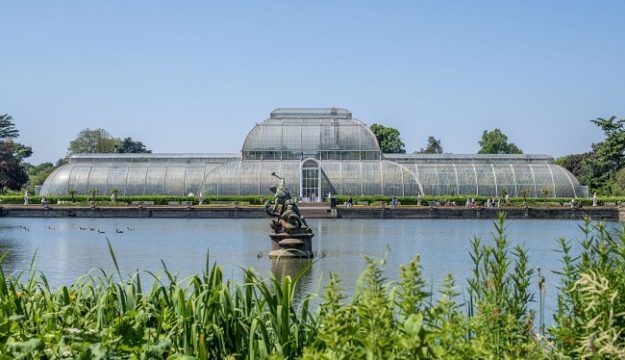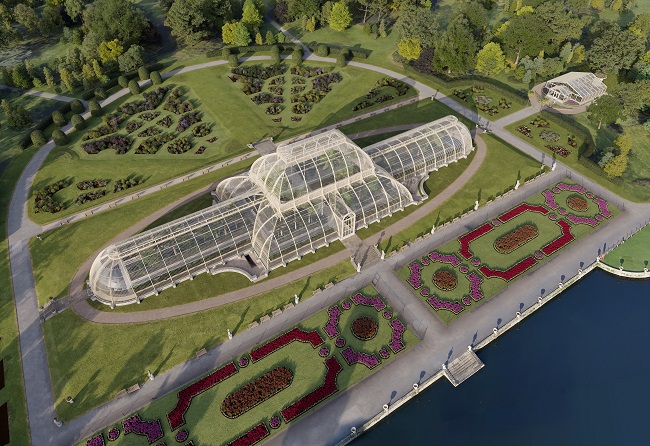 View of the Palm House from across the pond, summer 2023.
Image Stuart Davidson © Board of Trustees, RBG Kew
View of the Palm House from across the pond, summer 2023.
Image Stuart Davidson © Board of Trustees, RBG Kew
- Planning submitted for the Palm House and Waterlily House to undergo major renovation at Kew Gardens
- Ambitious aim to create the first net-zero heritage glasshouses of their kind in the world
- Iconic cultural buildings showing serious signs of deterioration
- Needs of horticulturists, engineers and architects must be balanced with precision, a challenge that has not been attempted for a building of this kind before
Royal Botanic Gardens, Kew has submitted a planning application to the London Borough of Richmond upon Thames to undertake a landmark renovation of the iconic Palm House and Waterlily House. The proposed renovation aims to create the first heritage net-zero glasshouses of their kind, conserving two of the UK’s most iconic buildings while radically reimagining their design for a more sustainable future.
Both the Palm House and Waterlily House are currently showing serious signs of deterioration, having last undergone a renovation in the 1980s. Without urgent work the listed buildings and tropical plants they protect are at risk of being lost forever.
Context and history
Constructed between 1844 and 1848 using techniques borrowed from the shipbuilding industry, the Palm House represented cutting-edge technology and thinking at that time. A companion building to the Palm House, the Waterlily House opened in 1852 and was purpose-built to showcase Victoria amazonica – the world’s largest waterlily.
RBG Kew’s aspiration to help create a world where nature is protected, valued and managed sustainably means there is also a need to bring these heritage landmarks into the 21st century through pioneering sustainable engineering. This renovation, with an ambition to achieve net zero, once again positions the iconic Palm House at the forefront of innovation.

Proposed Aerial View, image © ArcMedia
This exciting re-imagining of one of the UK’s cultural treasures marks a significant new chapter in its storied history. Having previously transitioned from coal to oil and then to gas, this is the first time in history that renewable options can feasibly be used to power the Palm House, creating a carbon neutral Victorian glasshouse that will protect the 1300 plants housed within. However, to achieve this ambition the (often contradictory) needs of horticulturists, engineers and architects must be balanced with precision, a challenge that has not been attempted for a building of this kind before.
Richard Deverell, Director of RBG Kew, says: “This is a pivotal moment in the history of Kew. With sustainability at the core of our mission, this project exemplifies our commitment to safeguarding both the environment and cultural heritage. The transformation of the Palm House and Waterlily House into net-zero icons will not only protect irreplaceable plants but serve as a beacon of what sustainable heritage can achieve.”
How will this be achieved?
The redevelopment is being led by the Kew Capital Projects Team who, together with Hugh Broughton Architects and Cundall engineers, have undertaken years of rigorous testing to strike the difficult balance between energy efficiency and the specific needs of the tropical plants housed within.
Key features of the design include:
- Replacement of 16,500 glass panes with high-performance sealed glazing
- Use of bespoke silicone gaskets to reduce heat loss
- Move to a fully electrified air and water source heat pump system
- Maximised rainwater storage and irrigation system upgrade
- Sensitive conservation of original materials and finishes
- Restoration of Sir William Nesfield’s original ornamental garden layout
- Improved access to make the space fully inclusive
Work happening already and timings
The relocation and propagation of plant specimens by Kew’s expert horticulturists has already begun, safeguarding plants from some of the most threatened environments in the world. Though the project is not expected to start until 2027, and will last four to five years, visitors to the Palm House can already see specialist work re-potting, air-layering and relocating plants to ensure the survival of over 1000 plant species housed within. Two cutting-edge glasshouses, one permanent and one temporary, have been built for the cultivation of tropical plants, each using advanced systems to control the temperature, humidity and light management more sustainably.
Tom Pickering, Head of Glasshouse Collections at RBG Kew, explains:
“At the heart of this project is the need to protect the extraordinary plant collections housed in the Palm House and Waterlily House. Besides being beautiful, many have cultural, scientific and conservation value, and replacing these collections is unimaginable. Achieving net zero in these historic buildings is an unprecedented task, it’s a complex challenge which must consider the interplay of horticulture, climatic control, engineering, and architecture.”
Hugh Broughton, Hugh Broughton Architects, says: “The Palm House and Waterlily House at Kew Gardens are instantly recognisable icons of Victorian innovation. This exciting project will help to conserve and decarbonise these inspiring glasshouses and make them more accessible to a wider audience. The design elegantly reflects Kew’s ambitious Climate Positive 2030 strategy, reminding us of the fragility of the rainforests and our role in their protection.”
This project, which is expected to cost in the region of £60 million, will safeguard the Palm House for future generations, and realise the ambition of making the Palm House and Waterlily House the first net zero glasshouses of their kind. The Board of Trustees of the Royal Botanic Gardens, Kew would like to thank all those who have given and pledged support to the Palm House project so far including Defra, Julia Rausing Trust, World Monuments Fund Britain, and those who have chosen to remain anonymous. We will be seeking funding for this major project throughout its duration.
For more information on how to support the project visit https://support.kew.org/donate/palmhouse or call 02083323246





